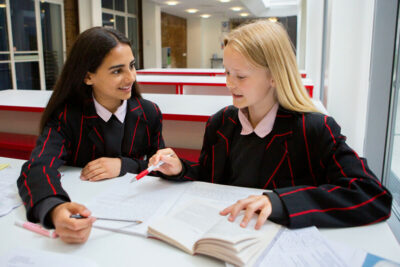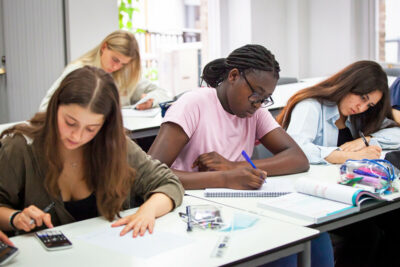In Key Stages 3 and 4 Lady Margaret School follows the National Curriculum and offers a curriculum designed to develop a range of skills that will support and challenge students in reaching their full academic potential. The academic curriculum combines with PSHE and a wide range of extra-curricular activities to promote the spiritual, moral, cultural, mental and physical development of students, and to prepare them for the opportunities, responsibilities and experiences of later life. A strong collective worship ethos also provides students with the necessary values, skills and habits to appreciate human creativity and achievement and to become educated citizens.
The school offers a range of academic subjects at Advanced Level. This is an academic curriculum designed to provide students in the Sixth Form with the best opportunities to pursue their chosen course at University. The entry requirements are a minimum of six grade 6s at GCSE, and some subjects have additional entry requirements.
If you require any further information regarding the curriculum please contact us.
Online Learning
Where circumstances arise which mean that the school cannot open for some or all of the students for example due to industrial action or bad weather. Provision will be made for learning to move online. In these circumstances the school will communicate all arrangements to students, parents/carers and staff. The school will use show my homework, google classroom and zoom to ensure continuity of provision online as necessary.
KS3 Subject Overview
 Lady Margaret School follows the National Key Stage 3 Curriculum; the core subjects offered are English, Mathematics, and Science. In addition, the foundation subjects offered are Religious Studies, Modern Foreign Languages (French and Spanish), History, Geography, Drama, Art and Design, PSHE (Personal, Social, Health and Economic Education), Computer Science, Design and Technology, Music and Physical Education.
Lady Margaret School follows the National Key Stage 3 Curriculum; the core subjects offered are English, Mathematics, and Science. In addition, the foundation subjects offered are Religious Studies, Modern Foreign Languages (French and Spanish), History, Geography, Drama, Art and Design, PSHE (Personal, Social, Health and Economic Education), Computer Science, Design and Technology, Music and Physical Education.
PSHE is delivered by the form tutor in a timetabled lesson. Citizenship is also addressed in other areas of the curriculum and as part of the school’s collective worship.
KS4 Subject Overview
Lady Margaret School follows the National Curriculum at Key Stage 4 with all students studying the compulsory core subjects at GCSE: English Language, English Literature, Mathematics and Combined or Triple Science. Students must study additional subjects; GCSE Religious Studies, well-being and PSHE and Games (non-examined physical education). A Modern Foreign Language (French and/or Spanish) is compulsory for most students, and all students must study a humanities subject – either Geography and/or History. Each student must then select an additional subject though the options system; the choices are: Food Preparation and Nutrition, Design and Technology Textiles, Drama, Music or Art and Design. A small number of students also study Latin for which there is off-site provision. Students not required to take a Modern Foreign Language have additional provision in English and Mathematics.
KS5 Subject Overview
 Students in the Sixth Form are able to select three A Level subjects from a range of academic subjects in different option blocks. Subjects offered include Art History, Biology, Chemistry, Design and Technology (Textiles), Economics, English Literature, Fine Art, French, Geography, History, Mathematics, Music, Physics, Politics, Psychology, Sociology and Spanish. Further Mathematics is offered outside of these option blocks. The most able students are able to take 4 A Level subjects and/or study for the Extended Project Qualification. All students are required to attend a weekly Beliefs and Values lesson and they have a say in designing the curriculum for this course.
Students in the Sixth Form are able to select three A Level subjects from a range of academic subjects in different option blocks. Subjects offered include Art History, Biology, Chemistry, Design and Technology (Textiles), Economics, English Literature, Fine Art, French, Geography, History, Mathematics, Music, Physics, Politics, Psychology, Sociology and Spanish. Further Mathematics is offered outside of these option blocks. The most able students are able to take 4 A Level subjects and/or study for the Extended Project Qualification. All students are required to attend a weekly Beliefs and Values lesson and they have a say in designing the curriculum for this course.
There is also one compulsory PSHE lesson per week and this provides time for a range of essential activities such as discussion of social and moral issues, guest speakers, careers advice, preparation for university applications and mock interviews. All students take part in a well-being programme run across the year.
All Sixth Form students are expected to contribute to the wider life of the school, for example by academic mentoring of students in lower year groups, running extra-curricular clubs, or acting as subject prefects.

